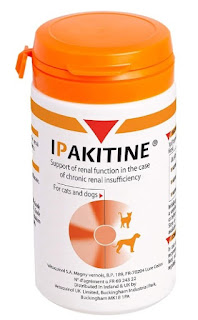Believe me, I have tested them all. Two of my three senior cats have renal failure. When my youngest cat Olivia was diagnosed with chronic kidney disease I tried all the CKD products I could get my hands on. So much wasted money!
Most vets only recommend renal diet foods to cats with CKD, but it's even more important to use products which bind phosphate and reduce its absorption from the intestines. If you want the easy way and not to force-feed your cat it's crucial to find renal products that your cat will take willingly, preferably mixed with food. Usually these products need to be given twice a day.
There are surprisingly many CKD products available, but at first I only knew about Pronefra's existence. It's in liquid form, so it's probably the best option for those owners who have to force feed their cat. But since I wanted to avoid that I kept trying others.
My cat Olivia is a fussy eater, but she gladly took Ipakitine mixed with her wet food. Unfortunately Ipakitine has lactose as a filler, and that makes absolutely no sense at all because most cats are lactose intolerant. So is my Olivia, and Ipakitine caused her diarrhea. So in conclusion Ipakitine is tasteless and odourless, and most cats will eat it willingly. But it is not suitable for those who can't digest lactose.
My oldest cat Kali is now 18 years old, and she was recenly diagnosed with chronic kidney disease aswell. She takes Wepharm's WeNefro voluntarily, mixed with soup wet food. Wenefro seems to be a good product, it has many ingredients which fight against complications renal insuffiency can cause to cats. Where to buy WeNefro? I'm sorry, I haven't been able to find international webstores which would sell it.
I give Olivia Porus One, mixed with wet food once a day, and she eats it willingly most of the time. Porus One is different from many other CKD products. It's black powder, and it looks like gun powder. It's actually activated carbon. It's important to mix it really well with wet food, so the cat won't notice it.
Renata is also a powder in single use packets. It smells bad, and neither of my CKD cats wanted to eat food if Renata was mixed in it.
Direne tablets Olivia refused to take, even if I crushed the tablets and hid the powder in her food.
What are the symptoms of chronic kidney disease (CKD) in cats? The most scary thing is that there might be no symptoms at all, so it's crucial to take senior cats to annual vet check ups and take the blood tests. A cat with renal failure might pee and/or drink a lot.






No comments:
Post a Comment